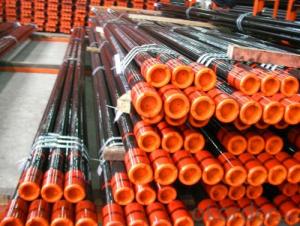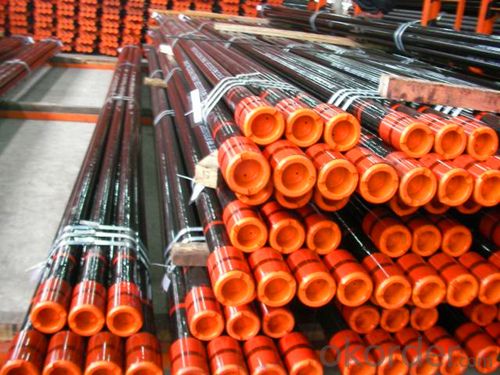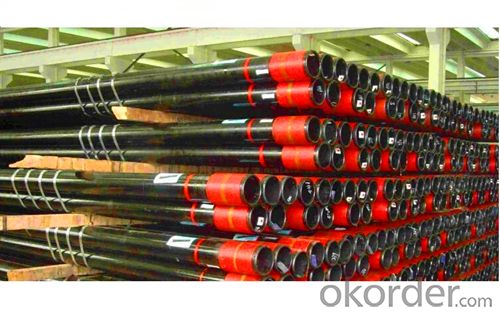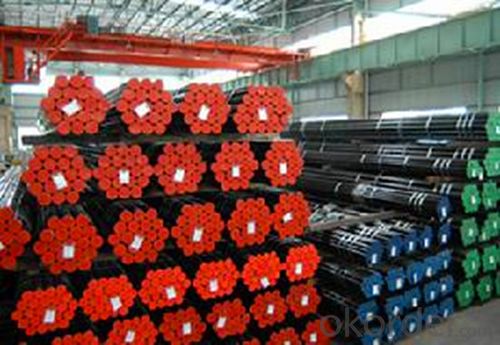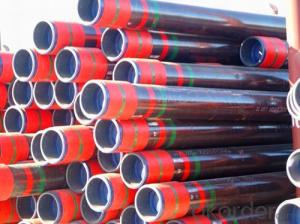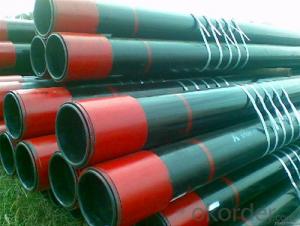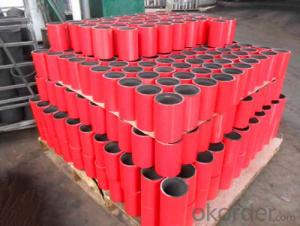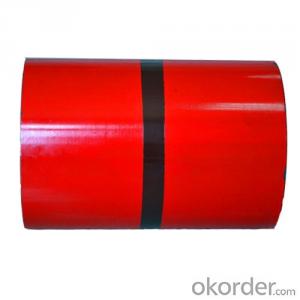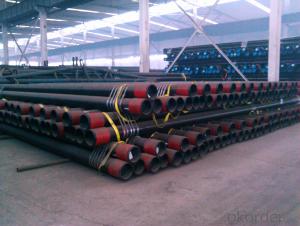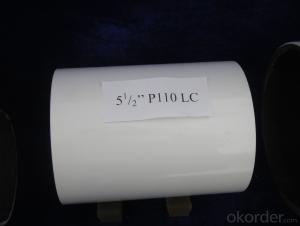Tubing Pipe of Grade L80 with API Standard
- Loading Port:
- Qingdao
- Payment Terms:
- TT OR LC
- Min Order Qty:
- 20 m.t.
- Supply Capability:
- 2000 m.t./month
OKorder Service Pledge
OKorder Financial Service
You Might Also Like
1. Structure of Tubing Pipe of Grade L80 Description
API 5CT Steel Pipe, L80 Oil/Petroleum tubing Pipe, OCTG
1) Size: O.D. 1.900", 2-3/8", 2-7/8", 3-1/2", 4-1/2"
2) Grade: J55, N80, L80, C90, T95, P110
3) Wall thickness: 3.18 - 10.54mm
4) Length: R1,R2,R3
5) Thread: 8RD and 10RD
6) All our Tubing accord with API SPEC 5CT standard.
2. Main Features of Tubing Pipe of Grade L80
1) Advanced test for quality
2) MTC, COC provided
3) Supervision is welcome
3. Tubing Pipe of Grade L80 Images
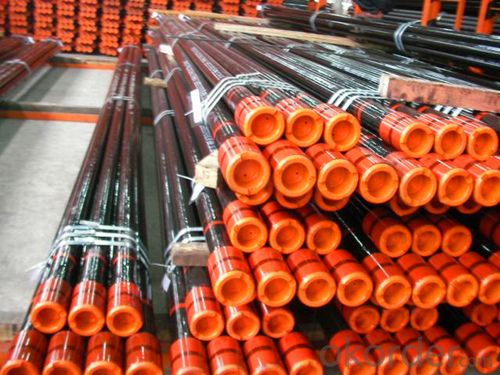
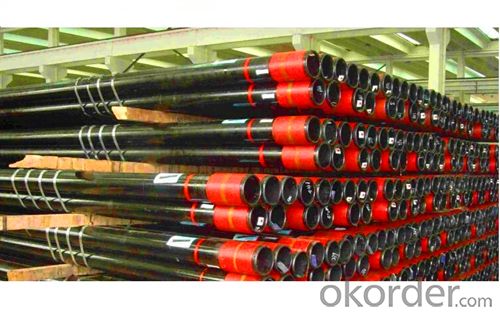
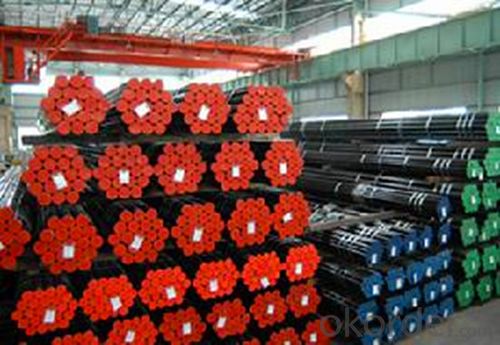
4. Tubing Pipe of Grade L80 Specification
Size Destination | Weight Destination | Outside Diameter | Wall Thickness | Type of End Finish | ||||||||
Grade | ||||||||||||
T&C Non-Upset | T&C External Upset | in | mm | in | mm | J55 K55 | L80 | N80 | C90 | T95 | P110 | |
1.900 | 2.40 | - | 1.900 | 48.26 | 0.125 | 3.18 | PI | - | - | - | - | - |
2.75 | 2.90 | 0.145 | 3.68 | PNUI | PNUI | PNUI | PNUI | PNUI | - | |||
3.65 | 3.73 | 0.200 | 5.08 | PU | PU | PU | PU | PU | PU | |||
4.42 | - | 0.250 | 6.35 | - | P | - | P | P | - | |||
5.15 | - | 0.300 | 7.62 | - | P | - | P | P | - | |||
2 3/8 | 4.00 | - | 2.375 | 60.3 | 0.167 | 4.24 | PN | PN | PN | PN | PN | - |
4.00 | 4.70 | 0.190 | 4.83 | PNU | PNU | PNU | PNU | PNU | PNU | |||
5.80 | 5.95 | 0.254 | 6.45 | - | PNU | PNU | PNU | PNU | PNU | |||
6.60 | - | 0.259 | 7.49 | P | P | P | P | P | - | |||
7.35 | 7.45 | 0.336 | 8.53 | PU | PU | PU | PU | PU | - | |||
2 7/8 | 6.40 | 6.50 | 2.875 | 73.02 | 0.217 | 5.51 | PNU | PNU | PNU | PNU | PNU | PNU |
7.80 | 7.90 | 0.276 | 7.01 | - | PNU | PNU | PNU | PNU | PNU | |||
8.60 | 8.70 | 0.308 | 7.82 | - | PNU | PNU | PNU | PNU | PNU | |||
9.35 | 9.45 | 0.340 | 8.64 | - | PU | - | PU | PU | - | |||
10.50 | - | 0.392 | 9.96 | - | P | - | P | P | - | |||
11.50 | - | 0.440 | 11.18 | - | P | - | P | P | - | |||
3 1/2 | 7.70 | - | 3.500 | 88.9 | 0.216 | 5.49 | PN | PN | PN | PN | PN | - |
9.20 | 9.30 | 0.254 | 6.45 | PUN | PUN | PUN | PNU | PNU | PUN | |||
10.20 | - | 0.289 | 7.34 | PN | PN | PN | PN | PN | - | |||
12.70 | 12.95 | 0.375 | 9.53 | - | PUN | PUN | PNU | PNU | PUN | |||
14.30 | - | 0.430 | 10.92 | - | P | - | P | P | - | |||
15.50 | - | 0.476 | 12.00 | - | P | - | P | P | - | |||
17.00 | - | 0.530 | 13.46 | - | P | - | P | P | - | |||
4 | 9.50 | - | 4.00 | 101.6 | 0.226 | 5.74 | PN | PN | PN | PN | PN | PN |
10.70 | 11.00 | 0.262 | 6.65 | PU | PU | PU | PU | PU | PU | |||
4 1/2 | 12.60 | 12.75 | 4.500 | 114.3 | 0.271 | 6.88 | PNU | PNU | PNU | PNU | PNU | - |
15.20 | - | 0.337 | 8.56 | - | P | - | P | P | - | |||
17.00 | - | 0.380 | 9.65 | - | P | - | P | P | - | |||
18.90 | - | 0.430 | 10.92 | - | P | - | P | P | - | |||
21.50 | - | 0.500 | 12.70 | - | P | - | P | P | - | |||
23.70 | - | 0.560 | 14.22 | - | P | - | P | P | - | |||
26.10 | - | 0.630 | 16.00 | - | P | - | P | P | - | |||
5. FAQ of Tubing Pipe of Grade L80
We have organized several common questions for our clients,may help you sincerely:
①How about your company?
One of the leading manufacturers and suppliers specializing in steel pipe products in China, mainly offering four series steel pipes including welded steel pipe (ERW, SSAW, LSAW and square and rectangle pipe), seamless steel pipe, hot dipped galvanized steel pipe and steel pipe with 3 layer polythene coating. We can provide customers different specification standards e.g. ASTM A53, ASTM A106, BS1387, API 5L, API 5CT, ISO3183 and etc. Our scope of supplying covers from 1/2" to 48" for the outside diameter of welded pipes, and 1/8" to 20" for the seamless pipes.
Other than steel pipes we are also capable of supplying a wide variety of pipeline accessories, steel pipe fittings; valves etc. consists of our one-stop sales. The integrated sales & service ensures customers with various demands an easier access for purchasing management.
②How to guarantee the quality of the products?
We have established the international advanced quality management system,every link from raw material to final product we have strict quality test;We resolutely put an end to unqualified products flowing into the market. At the same time, we will provide necessary follow-up service assurance.
③How long can we receive the product after purchase?
In the purchase of product within three working days, We will arrange the factory delivery as soon as possible.
- Q: A333gr6 steel pipe and domestic material of the same?
- A333Gr.6 steel is no nickel steel is a kind of fine grain aluminum low temperature toughness of steel, therefore, also called Al killed steel. A333Gr.6 belongs to the United States ANSI and ASTM-SA333 cryogenic steel standards and is used at the lowest impact temperature of -46 degrees celsius. Its temperature, range of use and fracture toughness value are similar to those of domestic 16Mn steel (the minimum usage temperature of 16Mn steel is -40 degrees Celsius).
- Q: What are the different types of steel pipe supports for thermal expansion?
- There are several different types of steel pipe supports that can be used for thermal expansion, including rigid supports, sliding supports, and spring supports. Rigid supports provide fixed support to the pipe and do not allow for any movement. Sliding supports allow the pipe to move horizontally as it expands or contracts, while still providing vertical support. Spring supports use springs to support the weight of the pipe and allow for vertical movement as well as thermal expansion.
- Q: Fastener type steel pipe scaffold external parts name
- Steel pipeScaffold steel pipe should adopt outer diameter 48mm and wall thickness 3.5mm welded steel pipe, also can use outer diameter 51mm and wall thickness 3.1mm welded steel pipe. For horizontal horizontal rods, the maximum length of steel pipe shall not be greater than 2m; other poles shall not be greater than 6.5m, and the maximum mass of each steel tube shall not exceed 25kg, so as to be suitable for manual handling.
- Q: What does "DN25 PN16" mean?
- The welded steel pipe can be divided into thin-wall steel tube, ordinary steel pipe and thickened steel tube according to the thickness. Its nominal diameter is neither external diameter nor internal diameter, but a nominal size similar to the diameter of the ordinary steel pipe. Each nominal diameter corresponds to an outer diameter, and the inner diameter varies with the thickness. Nominal diameter can be expressed in metric mm, also available in English in. With nominal diameter pipeline accessories, meaning with tube. "DN25" means the inner diameter of the steel pipe is 25MM.
- Q: What is the cost of steel pipes compared to other materials?
- The cost of steel pipes compared to other materials can vary depending on factors such as size, grade, and market conditions. However, in general, steel pipes tend to be more cost-effective and economical compared to other materials like copper or PVC. Steel is a durable and versatile material that offers excellent strength and longevity, making it a preferred choice in various industries such as construction, oil and gas, and plumbing.
- Q: How do steel pipes connect to other components?
- Steel pipes can be connected to other components using various methods such as welding, threading, flanges, or couplings.
- Q: How do you protect steel pipes from fire?
- There are several measures available to protect steel pipes from fire. One commonly used approach involves applying fire-resistant coatings or paints to the surface of the pipes. These coatings or paints are specifically designed to endure high temperatures and create a barrier that prevents heat from reaching the steel. Another effective method is to wrap the steel pipes with fire-resistant insulation materials. These materials serve as a buffer, reducing heat transfer and slowing down the spread of fire. Mineral wool or ceramic fiber blankets are commonly utilized for this purpose. It is also crucial to ensure proper installation and support for the steel pipes. This includes maintaining adequate clearance from other flammable substances and avoiding overcrowding or obstructions that could hinder the flow of air around the pipes. Sufficient spacing between pipes is also essential to prevent heat transfer between them. Moreover, incorporating firestop systems is recommended when steel pipes pass through fire-rated walls or floors. These systems consist of fire-resistant materials and seals that prevent the spread of fire and smoke through openings or penetrations in fire-rated barriers. Regular maintenance and inspections are essential to uphold the ongoing effectiveness of the fire protection measures. Any damage or deterioration of the coatings, insulation, or firestop systems should be promptly addressed to maintain the fire resistance of the steel pipes. In conclusion, a combination of fire-resistant coatings, insulation, proper installation, and maintenance practices is imperative for safeguarding steel pipes against fire hazards. These measures play a crucial role in minimizing the risk of fire-related damage and ensuring the safety of both the pipes and the surrounding environment.
- Q: How are steel pipes classified based on their wall thickness?
- Steel pipes are classified based on their wall thickness into three categories: standard, extra strong, and double extra strong.
- Q: How do you calculate the pipe thermal expansion coefficient for steel pipes?
- To calculate the pipe thermal expansion coefficient for steel pipes, you need to consider the material's linear expansion coefficient and the change in temperature. The linear expansion coefficient for steel is typically around 12 x 10^-6 per degree Celsius. First, determine the initial length of the pipe, which is denoted as L0. Then, measure the change in temperature, denoted as ΔT. Next, multiply the initial length of the pipe by the linear expansion coefficient and the change in temperature: ΔL = L0 * α * ΔT. The resulting value, ΔL, represents the change in length of the steel pipe due to thermal expansion.
- Q: How are steel pipes used in the manufacturing of desalination plants?
- Steel pipes are used in the manufacturing of desalination plants for various purposes, such as transporting seawater, brine, and freshwater through different stages of the desalination process. They are also used for the construction of pipelines, intake systems, and discharge outlets, ensuring durability, corrosion resistance, and efficient water flow in these critical systems.
Send your message to us
Tubing Pipe of Grade L80 with API Standard
- Loading Port:
- Qingdao
- Payment Terms:
- TT OR LC
- Min Order Qty:
- 20 m.t.
- Supply Capability:
- 2000 m.t./month
OKorder Service Pledge
OKorder Financial Service
Similar products
Hot products
Hot Searches
Related keywords
